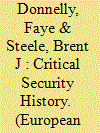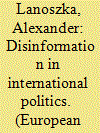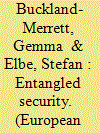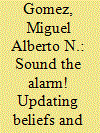|
|
|
Sort Order |
|
|
|
Items / Page
|
|
|
|
|
|
|
| Srl | Item |
| 1 |
ID:
165332


|
|
|
|
|
| Summary/Abstract |
This article makes a case for incorporating the concept of ‘Critical Security History’ (CSH) into security studies. While history plays a powerful role in a cornucopia of security stories, we contend that it often goes unnoticed in scholarly research and teaching. Against this backdrop, we present a detailed guide to study how history is told and enacted in non-linear ways. To do this, the article outlines how CSH can contribute to securitisation and ontological security studies. As shown, this lens casts a new light on the legacies of (de)securitisation processes and how they are commemorated. It also illustrates that ontological security studies have only begun to call into question the concept of historicity. Working through these observations, the article marshals insights from Halvard Leira's notion of ‘engaged historical amateurism’ to entice scholars interested in ‘doing’ CSH. While acknowledging that this research agenda is hard to achieve, our study of the 2012 Sarajevo Red Line project helps to illustrate the added value of trying to ‘do’ CSH in theory and in practice. We end with some reflections for future research and continued conversations.
|
|
|
|
|
|
|
|
|
|
|
|
|
|
|
|
| 2 |
ID:
165333


|
|
|
|
|
| Summary/Abstract |
Concerns over disinformation have intensified in recent years. Policymakers, pundits, and observers worry that countries like Russia are spreading false narratives and disseminating rumours in order to shape international opinion and, by extension, government policies to their liking. Despite the importance of this topic, mainstream theories in International Relations offer contradictory guidance on how to think about disinformation. I argue that disinformation is ineffective in terms of changing the policies of a target as regards to its foreign policy alignments and armaments – that is, the balance of power. To be strategically effective, disinformation must somehow overcome three powerful obstacles: first, the fundamental uncertainty that international anarchy generates over any information broadcasted by adversaries; second, the pre-existing prejudices of foreign policy elites and ordinary citizens; and third, the countermeasures that are available even amid political polarisation. I examine the most likely case of there seemingly being a conscious and effective strategy that emphasises disinformation: the Russian campaign that has targeted the Baltic states, especially since the 2014 annexation of Crimea. The available evidence strongly suggests that the strategic effects of disinformation are exaggerated.
|
|
|
|
|
|
|
|
|
|
|
|
|
|
|
|
| 3 |
ID:
165328


|
|
|
|
|
| Summary/Abstract |
This article advances a new account of security as an intensely relational and ontologically entangled phenomenon that does not exist prior to, nor independently of, its intra-action with other phenomena and agencies. Security's ‘entanglement’ is demonstrated through an analysis of the protracted security concerns engendered by ‘dangerous’ scientific experiments performed with lethal H5N1 flu viruses. Utilising methodological approaches recently developed in the field of Science and Technology Studies (STS), the article explicates the intensely ‘co-productive’ dynamics at play between security and science in those experiments, and which ultimately reveal security to be a deeply relational phenomenon continuously emerging out of its engagement with other agencies. Recovering this deeper ontological entanglement, the article argues, necessitates a different approach to the study of security that does not commence by fixing the meaning and boundaries of security in advance. Rather, such an approach needs to analyse the diverse sites, dynamics, and processes through which security and insecurity come to intra-actively materialise in international relations. It also demands a fundamental reconsideration of many of the discipline's most prominent security theories. They are not merely conceptual tools for studying security, but crucial participants in its intra-active materialisation.
|
|
|
|
|
|
|
|
|
|
|
|
|
|
|
|
| 4 |
ID:
165329


|
|
|
|
|
| Summary/Abstract |
Public opinion polls on national security issues are often seen as indicators of the strength of international human rights norms. By contrast, we hypothesise that the very act of answering poll questions can weaken citizens’ understandings of important international human rights laws and norms in the very moment they are being measured. We ground this discussion empirically by analysing a new dataset of post-9/11 survey questions on two US national security policies at odds with international human rights norms: ‘enhanced interrogations’ and ‘targeted killing’. In so doing, we encourage a widened research agenda on how international legal and normative understandings are transmitted to the public through surveys. We conclude by highlighting substantive implications for norm scholars and policy implications for norm advocates.
|
|
|
|
|
|
|
|
|
|
|
|
|
|
|
|
| 5 |
ID:
165331


|
|
|
|
|
| Summary/Abstract |
To date, cyber security research is built on observational studies involving macro-level attributes as causal factors that account for state behaviour in cyberspace. While this tradition resulted in significant findings, it abstracts the importance of individual decision-makers. Specifically, these studies have yet to provide an account as to why states fail to integrate available information resulting in suboptimal judgements such as the misattribution of cyber operations. Using a series of vignette experiments, the study demonstrates that cognitive heuristics and motivated reasoning play a crucial role in the formation of judgements vis-à-vis cyberspace. While this phenomenon is frequently studied relative to the physical domain, it remains relatively unexplored in the context of cyberspace. Consequently, this study extends the existing literature by highlighting the importance of micro-level attributes in interstate cyber interactions.
|
|
|
|
|
|
|
|
|
|
|
|
|
|
|
|
| 6 |
ID:
165330


|
|
|
|
|
| Summary/Abstract |
Few issues are more important yet less understood than outside interventions in intra-state conflicts. Under what circumstances do intervening states further their interests and when, contrarily, do they plunge into quagmires? France is a critical case. It is, statistically, the world’s second intervenor and earned the sobriquet of Africa’s gendarme through frequent interventions in African wars. The ability of such a medium-sized state to intervene with greater regularity and ostensible success than larger powers raises questions about how France manages its interventions. Do French interventions draw on the French Army’s distinctive ‘school’ of population-centric counterinsurgency, which emphasises the need to militarise governance in pursuit of comprehensive victories? Or do the French Fifth Republic’s civil-military institutions encourage policymakers to carefully regulate force’s employment in pursuit of limited ends? This study draws on declassified archives to test which approach most characterises French interventions. To preview my conclusions, strategic satisficing – the use of minimal force for short durations to produce satisfactory outcomes – distinguishes the Fifth Republic’s interventions from other powers’ practices and prior French counterinsurgencies. This particular form of interventionism enables France to influence a large number of intra-state conflicts and maintain a network of security agreements with African states.
|
|
|
|
|
|
|
|
|
|
|
|
|
|
|
|
|
|
|
|
|